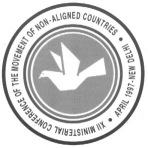 |
NAM reiterates its support for NEW DELHI, April 7 (G-77/IPS) — The Non-Aligned Movement (NAM) has reiterated its support for a U.N. conference on South-South cooperation, a proposal initiated by the Special Ministerial Meeting of the Group of 77 commemorating the thirtieth anniversary of the Group, held in June 1994 under the Chairmanship of Algeria. At a meeting held in New Delhi, NAM foreign ministers acknowledged that the full potential of South-South cooperation is yet to be realised. The ministers therefore committed themselves to strengthening and expanding present efforts, initiating new and concrete forms and priorities for cooperation, including projects by groups of developing countries, and devising realistic and viable modalities for their implementation. A final 102-page declaration adopted at the ministerial meeting says that regional and sub-regional arrangements on economic cooperation and integration are intensifying. The ministers singled out several regional cooperative efforts currently underway, including the South Asian Free Trade Area, the ASEAN Free Trade Area, the Latin American Free Trade Area and the Action Plan for Arab Free Trade Area. The declaration also commended the activities of the Economic Cooperation Organisation (ECO), the Gulf Cooperation Council (GCC), the South African Development Community (SADC), the Economic and Monetary Community of Central Africa (EMCCA), the Economic Community of Central African States (ECCAD), the West African Monetary Union, CARICOM, the Andean Pact, the Latin American Integration Association, the Association of Caribbean States and the Central American Integration Association. They also noted with satisfaction the work of the Arab Maghreb Union (UMA) and the establishment of the Indian Ocean Rim Association for Regional Cooperation. They stressed that South-South cooperation should be promoted through the sharing of development experiences, transfer of technology and exploiting the latent synergies and complementarities between the non-aligned countries and increasing the FDI flows and economic cooperation among them. The New Delhi conference also discussed the upcoming General Assembly special session in June to review the progress on implementing a blueprint for balancing development and conservation. The New Delhi meet also called to consider ways to ensure the world’s biggest international movement remains relevant in the next century. A sure way of doing this is by giving NAM members a decisive say in reformed U.N. decision making process, it was pointed out by speakers at the plenary session. The last NAM summit was held in Cartegana, Colombia, in 1995. Heads of State and Government will meet again next year in South Africa. Denying that the end of superpower rivalry had robbed the movement of its main role, Colombia’s foreign minister Mejia Velez quoted from her President Ernesto Samper’s declaration last year that ‘’while it was true that the Cold War was over, poverty was not over, nor was isolation, nor plundering of the environment, nor commercial and technological restrictions on the South.’’ ‘’It is our responsibility to see that the eradication of extreme poverty and reduction of the gap between the rich and poor countries figures as the main objective on the universal social agenda,’’ she added. Addressing the conference, U.N. Secretary General Kofi Annan said NAM nations deserved a bigger role in the world body which still reflected "the geopolitical realities of the 1940’s." Following are excerpts of his statement: "The surest foundation for peace, stability and security is economic and social development. That is why I intend both to reform the role of the United Nations in international cooperation for development, and to do all I can to ensure that greater resources are devoted to it. The commitment to development is one of the guiding beacons of the work of the United Nations. Peacekeeping and peacemaking may catch the headlines, but in terms of resources, and in terms of the changes made in peoples' lives, the development work of the United nations is far more significant. With the end of the cold war, we have been able to re-examine many of our traditional assumptions about development. It has become cleat that while the eradication of poverty and securing development are the responsibilities of individual states, the United Nations system has a key conceptual and promotional role to play. The ultimate objective -- securing the development of development of developing countries -- remains the same. But we need to re-examine constantly the means of attaining that objective. We need to ensure that our approach to development takes full account of the economic, political and technological realities of our times - especially the role of the private sector and of civil society. That is how I am approaching the question of reform of the United Nations development system. To make it sensitive to the concerns of developing countries; capable of mobilizing political support; able to enhance its capacity for data gathering and analysis and norm-setting; and, above all, able to provide assistance at the country level efficiently and cost-effectively. I would want to see any cost savings in the larger reform effort being ploughed back into tangible development activities by the United Nations. The United Nations can become a powerful force for development as a democratic voice of the weak; as a forum for consensus-based action; through its advocacy and outreach role; by forging new alliances and partnerships; through the promotion of shared values; and through cost-effective and efficient development activities." |